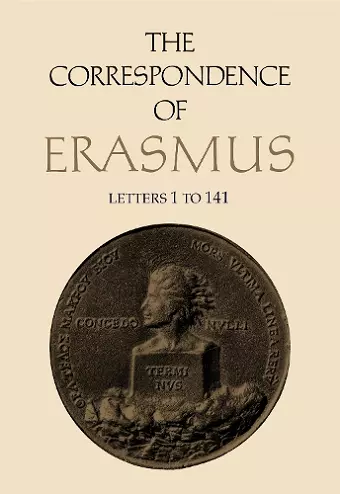The Correspondence of Erasmus
Letters 1-141, Volume 1
Desiderius Erasmus author Wallace K Ferguson translator RAB Mynors translator DFS Thomson translator
Format:Hardback
Publisher:University of Toronto Press
Published:4th Nov '02
Currently unavailable, and unfortunately no date known when it will be back
This hardback is available in other editions too:

The correspondence of Erasmus has never been completely translated into English, although it has long been acknowledged to be one of the most illuminating sources for the history of northern humanism and the first two decades of the Protestant Reformation. In his letters, to and from scholars and religions leaders, printers and patrons, princes and prelates in every country of western Europe, the interests and issues of that critical era found free expression. They are connected by the thread of Erasmus' personal experience, his joys and sorrows, triumphs and tribulations, and his uninhibited conversation with his friends.
Erasmus himself regarded his letters as a form of literature, and they were valued in his time, as they are now, as much for their style as for their content. In The Study of Good Letters (Clarendon 1963), H.W. Garrod wrote: 'As a document of the history of the times the Letters have primary importance. Yet they ar to be valued, ultimately, not as they enable us to place Erasmus in history, but as they help us to disengage him from it, to redeem him out of history into literature, placing him where, in truth, he longed to be. Not the Folly nor the Colloquies but the Letters, are his best piece of literature. What he did in scholarship, whether biblical, patristic, or classical has been superseded - though not the fine temper of it. That fine free temper shines also in the Letters, being indeed one of the elements of literature… In the immortality of their readableness Erasmus lives securely, immune from the discredits of circumstances.'
The volume of the correspondence is enormous, and its cumulative effect fully justifies the claims that have been made for its importance. Erasmus was from his youth on an indefatigable correspondent, although he was careless about preserving his own letters or those written to him until he became famous and found printers eager to publish them. As a consequence, 85 per cent of the surviving letters were written after he reached the age of forty-five. Even when he had no thought of publication, however, he strove ceaselessly to make his letters models of elegant classical latinity, while adjusting the style of each letter to fit its purpose, content, and recipient. Even...
ISBN: 9780802019813
Dimensions: 254mm x 178mm x 36mm
Weight: 856g
416 pages